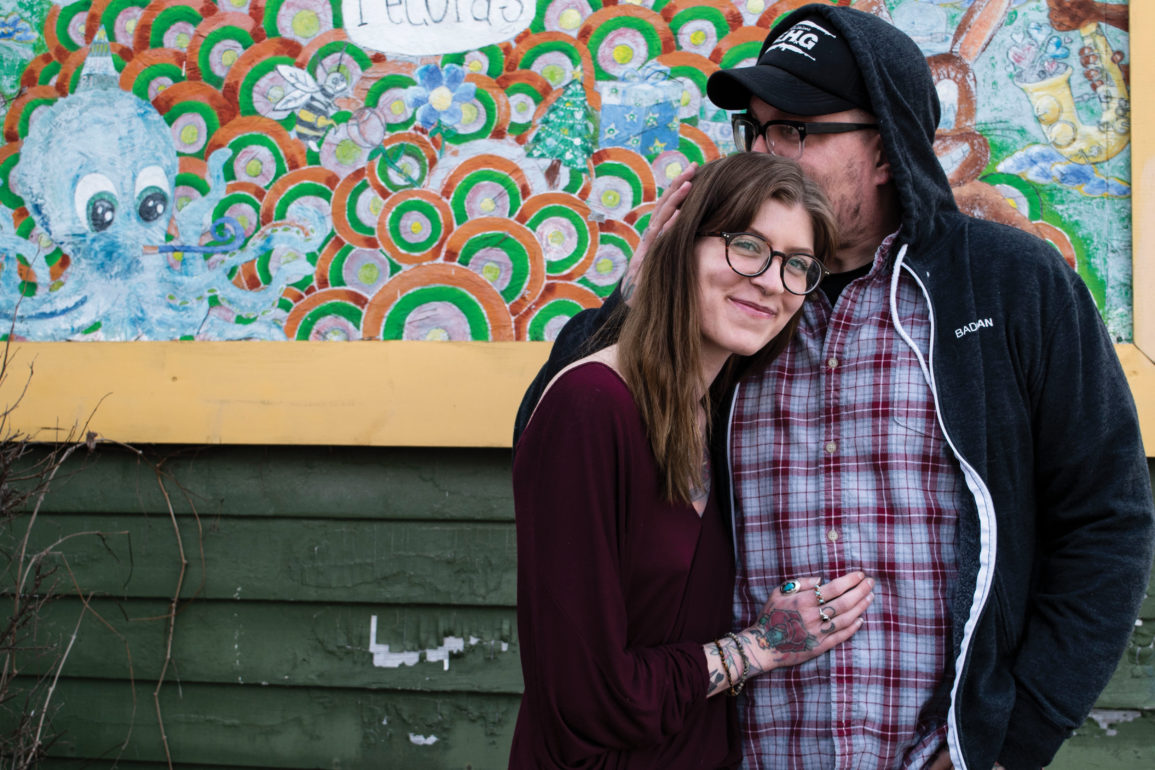An interfaith relationship isn’t for everyone, but some couples use their differences as a way to grow.
Ryan and Steph Remington were never ones for conventionality.
The pair tied the knot March 26, 2017, but the act of marriage was about the only traditional aspect of the day.
The two were wed at Aw Yeah Comics in downtown Muncie by close friend Grant Butler, a man who sports a ponytail that goes “damn near down to his ass” and is covered in tattoos. They were announced through a speech laden with references to iconic romances such as Han Solo and Leia Organa of the Star Wars franchise, or Scott Summers and Jean Grey of Marvel Comics’ X-Men Universe.
 The two were adamant there would be no mention of God in the ceremony, no religious traditions, though not for lack of faith.
The two were adamant there would be no mention of God in the ceremony, no religious traditions, though not for lack of faith.
Ryan is a lead teacher at The Table at Cana, a local bar ministry, and he preaches part-time. He religiously identifies as Christian. Steph is a local artist, depicting spiritual ideas in her work, and she practices crystal healing methods. She religiously identifies as a mixture of Wiccan and Roma. The couple has been together for about four-and-a-half years, and married for two.
Of couples married since 2010, nearly 40 percent were of different faiths, according to a 2015 study from Pew Research Center. Before the 1960s, only about 20 percent of married couples were interfaith.
From the perspective of Charlie Wiles, the executive director of the Center for Interfaith Cooperation, becoming interfaith is also a way to open your eyes to the many ways religion plays into everyday life and how we work together in society.
In this definition, interfaith means more than a romantic relationship between people of different religious backgrounds. It becomes a way to live.
For some, becoming interfaith is a choice to not define their spirituality by one religion’s guidelines but by the deeper morals and ethics rooted in all religions. For others, it’s a lifestyle they fall into, an inevitability if they want to be with the one they love.
When Steph and Ryan met, he was atheist while she upheld her Roma/Wiccan belief system. Over time, it was actually Steph’s down-to-earth kindness that led Ryan to his current faith.
“I began to see what Christ was getting at in the way Steph carries herself,” Ryan says. “The way she lives her life and the way she interacts with people—the grace, the passion, the mercy she just shows across the board—that has really bolstered my faith.”
When he realized the good in Steph, he realized the potential for good in others and was drawn to those who followed the Christianity. He found his place at The Table at Cana, where he leads a group meeting at Muncie’s Guardian Brewing Company. There, they push values of inclusion, creativity, and conversation.
In Steph’s case, when she and Ryan met, she had negative views of Christianity based off her childhood experiences. She originally grew up in the French Roma faith, but her father introduced Evangelical Christianity in their household when she was an older child.
“I had a really hard time understanding Christianity,” Steph says. “I had the very stereotypical viewpoint of ‘God is a guy with a long white beard, staring down from the clouds, and hell is fiery place below us.’ It just seemed very odd. Going to church used to scare me.”
But in meeting Ryan, she was able to recognize the greater good behind the faith.
“Seeing how Ryan’s grown, and the people that we know here in Muncie, they’ve shown me more of what Christianity actually is,” Steph says. “Ryan has definitely opened my eyes to the good of it.”
The couple recognizes their relationship was built on more than just their distinctive faiths.
“I love the person she is, not the thing she believes,” Ryan says. “I think that’s what’s most important.”
So long as deeper values are shared, interfaith unions are certainly feasible. Even if two people follow different faith traditions, they might agree on matters like finances, life goals, career values, leisure interests, or political stances, and those things might bring them together even more than a shared religion would.
For Ryan, his relationship with Steph has given him confidence to hold onto his beliefs with a “less certain grip.” He has become okay with the uncertainty of his religion, instead holding onto his love for his wife and the good he sees reflected in her.
“I don’t look at it as ‘Well, she’s going to hell because she didn’t say a prayer,’” Ryan says. “I look more at the way she lives her life, and I’m constantly inspired by that to be better.”
Similarity of spouses’ values and personalities has been linked to a higher level of marital satisfaction, according to a 2010 graduate dissertation by Patricia A. Fishman of Northern Illinois University. The study also found that interfaith couples might be better at negotiating and decision-making, not in spite but in light of their religious differences.
At the Center for Interfaith Cooperation, groups meet to practice a more general spirituality while discussing the different aspects of the world’s religions. Wiles aims to create environments where people can discuss those differences and learn more about one another.
“Having humility is needed for authentic interfaith relationships to blossom,” Wiles says. “If you don’t have strong self-esteem, and you fear losing your own faith tradition by appreciating how other people experience the divine, then I would recommend pursuing other interests.”
Fisherman’s study also found that in interfaith marriages, differences in religious beliefs can sometimes cause higher amounts of strain in the relationship.
Interfaith relationships might also weaken religious communities, as one person might be pulled away from their own religious traditions and practices by their spouse, according to Naomi Schaefer Riley, author of ‘Til Faith Do Us Part: How Interfaith Marriage is Transforming America.
But some religious leaders are beginning to not only accept, but even encourage interfaith relationships.
In a 2011 article for InterfaithFamily, the Rev. Walter H. Cuenin considers the possibility that interfaith marriages open the door to a greater understanding of modern faith. He believes interfaith marriages remind people that “human family transcends all religious boundaries.” He believes there is no religion that holds the one true path to God and that when people of different traditions marry, they might embody a new way of life—a way toward greater religious unity.
“Learning about diverse religious traditions allows people to better understand their own faith journey,” Wiles says.
This is exactly how Ryan was able to develop a strong foundation in the Christian faith. After falling in love with Steph, he was no longer searching for certainty, but for a way to better understand the world and his place in it.
This column was originally published in the spring 2019 print edition.




